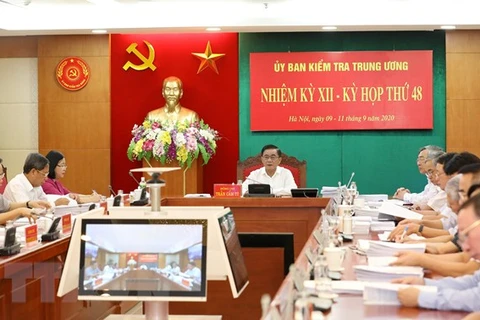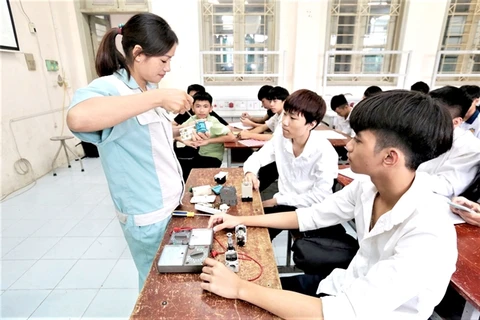 Students apply their practical skills during an automotive technician training class at Vien Dong College in HCM City. (Photo viendong.edu.vn)
Students apply their practical skills during an automotive technician training class at Vien Dong College in HCM City. (Photo viendong.edu.vn) The HCM City Technical and Economic College (HOTEC), for example, will recruit 1,400 students for 20 academic areas, an increase of 100 slots compared to 2020.
Due to high demand, HOTEC wants to add seven new subjects with an enrolment of 280 students.
The subjects include logistics, mechanical equipment and machinery maintenance, hotel management, vehicle maintenance and repair automobile chassis, automotive air-conditioning and climate control system, moulding manufacturing, and industrial electronics.
Graduates are expected to easily find jobs with high starting salaries.
At Vien Dong College, the enrolment target will be 2,500, up by 10 percent over the same period last year, Tran Thanh Hai, principal of the college, has said.
The two majors midwifery and database administration will be offered this year at the college in response to the shortage of human resources in health care and to the country's efforts in digital transformation.
In addition, the enrolment methods of vocational schools have been changed to draw candidates’ attention.
Tran Kim Tuyen, Principal of HCM City Vocational College, said that it would have 1,740 enrolment slots for courses at the intermediate and college levels, a slight increase of 11.5 percent compared to the same period in 2020.
Tuition policy has also been amended. HCM City Vocational College will reduce 70 percent of tuition fees for students majoring in metal cutting-CNC. If graduates from junior high school enrol at the intermediate level, the tuition fees will be fully exempted.
Dai Viet College needs 2,000 candidates for this academic year. It will focus on developing two subjects in demand, namely automotive and mechanical engineering.
The college will offer a 25 percent discount fee on tuition fees for excellent 12th grade students and a 50 percent discount on fees for excellent high school students.
Challenges from teaching online
In the meantime, many colleges in HCM City have used e-learning programmes during the COVID-19 crisis but many of them are struggling to ensure “learning by doing” for their engineering students.
Ly Tu Trong College, for example, has been operating 167 online classes with more than 10,000 students. All theory lessons are taught online.
Students are instructed to attend online classes and take internet-based exams. Before the online classes begin, teachers send students soft copies of the lessons. Students can also work in groups and answer questions as they do in conventional classes.
However, job training courses are more difficult to carry out as practical work in engineering laboratories are compulsory.
Vu Thong Nhat, an automotive engineering student at Thu Duc College of Technology (TDC), said that it was hard to practice by following teachers’ tutorial videos.
Practical lessons at TDC account for 70 percent of its training programmes for engineering majors, which require “on-the-job learning” and direct interaction between teachers and students, Nguyen Xuan Toan, vice rector of TDC, said.
According to Dr Bui Van Hung, vice rector of Ho Chi Minh Vocational College of Technology, teachers need to adopt a digital transformation mindset.
By 2030, the entire vocational education system is expected to be digitalised and reach the level of ASEAN-4 member countries, including Indonesia, Malaysia, Philippines and Thailand, according to the General Department of Vocational Training, under the Ministry of Labour, War Invalids and Social Affairs.
All public services related to vocational education will be online and integrated into the National Public Service Portal.
Thirty percent of vocational education establishments, or 600 schools, will complete their digital transformation, and all of them will have their classes online in the next 10 years.
To realise the goals, the vocational training department is in charge of the legal framework, database systems, technology platforms and human resources, Dr Pham Vu Quoc Binh, its deputy director general, said./.
VNA























